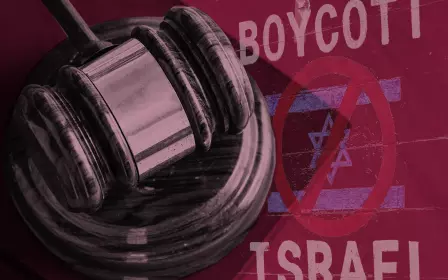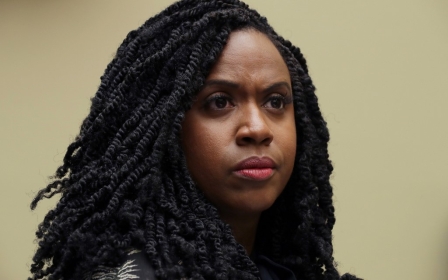US Ivy League school advised to divest from firms facilitating Israeli occupation

An advisory committee set up to monitor and recommend the investment policies of Brown University in Rhode Island has voted to divest from companies participating in the continued subjugation of Palestinians.
The successful passing of the resolution by the university’s Advisory Committee on Corporate Responsibility in Investment Policies (ACCRIP) on Monday paves the way for activists to pressure the university to withdraw support for companies "facilitating the [Israeli] occupation and its human rights abuses in the West Bank and Gaza".
In a statement released by Brown Divest, a coalition of undergraduate students that has been at the forefront of the call to divest from companies operating in the occupied territories, the group said they were "elated that the university committee responsible for divestment has finally joined the calls for divestment from human rights violations in Palestine".
“Today, ACCRIP made Brown the first Ivy League University to officially call for divestment from companies that are facilitating the occupation and its human rights abuses in the West Bank and Gaza. We look forward to other universities joining the movement for dignity and human rights for Palestinians,” the statement read.
New MEE newsletter: Jerusalem Dispatch
Sign up to get the latest insights and analysis on Israel-Palestine, alongside Turkey Unpacked and other MEE newsletters
According to the statement, the advisory committee - made up of faculty, students, staff and alumni of the University - voted on the following motion:
“We recommend that the Brown Corporation exclude from Brown’s direct investments, and require Brown’s separate account investment managers to exclude from their direct investments, companies identified as facilitating human rights violations in Palestine,” the resolution read.
“In addition, the Investment Office will share with all investment managers the University’s desire to adhere to this investment philosophy. We recommend that the Corporation and Brown’s separate account investment managers maintain the withdrawal of investments from said companies until they cease to engage in social harm … ”
A Divest Brown spokesperson told MEE that given that the ACCRIP recommendation is the official channel for divestment, for the recommendation to be implemented, Brown Corporation - which is how the university's governing body is referred to - has to approve it.
"We will continue to hold the University and the Brown Corporation accountable to the will of the students and the ACCRIP committee to divest from these holdings. In the past, ACCRIP has recommended divestment from genocide in Sudan and the tobacco industry, following which the Corporation divested from complicit companies," the spokesperson said.
Non-binding resolution
Brian E. Clark, a university spokesperson, clarified that the resolution was not binding.
"The committee is an advisory body. It was a vote to submit to the Brown University president a recommendation on divestment. There has been no Brown University decision or action to divest from companies 'facilitating human rights violations in Palestine'," Clarke told MEE.
A student at Brown associated with the activist group Social Justice with Palestine (SJP), told MEE that although the development was significant, it was anticipated that it would be harder to get the resolution passed by the university's governing body than previous resolutions targeting companies complicit in human rights abuses in Sudan.
"The Brown Corporation is accountable to itself ... some of the members of the corporation are from the biggest industries in the US," the student who asked to remain anonymous, said.
"We have literally people who are on the executive boards of weapons manufacturers, huge banks and as we know, these types don't have an incentive to see the rise of a broader BDS or a divestment movement," he added.
News of the vote was immediately lauded by activists and academics who have long argued for a Boycott Divestment and Sanction (BDS) campaign against Israel on US campuses.
Student activists associated with Students for Justice in Palestine at Harvard University and Columbia University in New York told MEE separately that the move was significant because it would set the tone for similar resolutions at other universities around the country.
Palestine Legal, an organisation that provides support and advocacy for Palestinian rights activists in the US, passed on their congratulations and said they were “committed to supporting students around the country in their pursuit of justice for Palestine.”
Moreover, Jewish Voice for Peace (JVP), the Jewish-American organisation that works for an end to the Israeli occupation, said they found the student activism inspiring.
'Decisive stance'
A spokesperson for Divest Brown told MEE that ACCRIP would now work towards implementing the resolution.
"We already provided the list of companies (along with our research on them) that ACCRIP will review, which include Caterpillar, Hewlett-Packard, Oaktree Capital Management, AB Volvo, Motorola, Boeing, Northrop Grumman, Lockheed Martin, Raytheon, United Technologies, and G4S," the spokesperson said.
Monday’s vote comes eight months after 69 percent of students at Brown University had voted for a call to end the university’s investments in companies that violate human rights through their work in Israel.
"This referendum not only represents a decisive stance on this issue, but a years-long mobilisation and unification of a diverse coalition of student groups around this campus," Divest Brown said.
At the time, Brown joined Swarthmore, NYU, UCLA, George Washington University and others who have had similar successful campaigns.
Following the vote in March, Christina Paxson, Brown’s University President, said that “Brown’s endowment is not a political instrument to be used to express views on complex social and political issues.” More than 90 faculty staff released a statement defending students for their activism.
While a number of university student bodies have passed resolutions calling for divestment, only Hampshire College has so far implemented the said resolutions.
Middle East Eye delivers independent and unrivalled coverage and analysis of the Middle East, North Africa and beyond. To learn more about republishing this content and the associated fees, please fill out this form. More about MEE can be found here.




